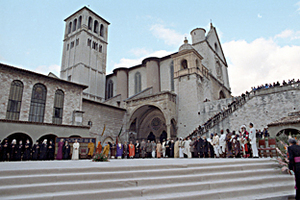Evangelization & Formation: July 2011 Archives
The head of the Communion and Liberation Movement, Father Julián Carrón wrote an editorial for tomorrow's (July 14, 2011) edition of the L'Osservatore Romano about the forthcoming Day of Prayer in Assisi on October 27, recognizing the theme of peace and justice.

The Day for Reflection, Dialogue and Prayer for Peace and Justice in the World, convoked in Assisi next October 27 by Benedict XVI is an audacious gesture, just as Blessed John Paul II's initiative was, 25 years ago.
"In the name of what can (Pope Wojtyla) call exponents of all religions together to pray in Assisi?" asked Don Luigi Giussani twenty-five years ago. He answered, "If one understands the nature of man, the heart of man, it is his religious sense, it is in the religious sense that all men find equality and identity. The most profound meaning in the human heart is religious sentiment, destiny on the one hand and the usefulness of the present on the other. If we want to use the right terms, a sense of religion is the only sense which is truly catholic, which means suitable for everyone and belonging to everyone."
Rino Fisichella, the archbishop who head's the Pope's evangelization office has rolled out his newest, that is, the first, endeavor since the founding of the office in the July 12 L'Osservatore Romano. They're calling it the "Metropolitan
mission" The goal is simple:
To avoid the risk of the new evangelization becoming just another formula adapted for every season, it is important that it be filled with content which informs the pastoral action of the different Christian communities. In this sense, everyday pastoral work, which has always animated the life of the Church, must renew its ways of presenting itself and implementing its activities.
Benedict XVI, speaking to the first plenary assembly of the Pontifical Council for Promoting the New Evangelization, said that it was of decisive importance to go beyond the fragmentation of society and offer concrete answers to the great challenges of today. To fill this need, a "metropolitan mission" has been put into action. The goal is simple: to give a sign of unity among the diverse dioceses present in the largest European cities that have been particularly affected by secularization.

